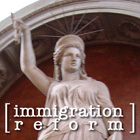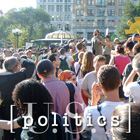
|
NEW PROTEST MOVEMENT SHOWS VITAL HISPANIC POPULATION NATIONWIDE PROTESTS, INCLUDING MARCHES, SCHOOL WALKOUTS, SIT-INS, RALLIES WITH SPEAKERS, REACT TO PUSH TO CRACK DOWN ON ILLEGAL IMMIGRATION 31 March 2006 The issue of "immigration reform" began sweeping the mindset and the Latin media markets of the United States in December, when the House of Representatives passed a bill that would classify all undocumented immigrants as "aggravated felons", and make it a crime to provide assistance of any kind to them, regardless of personal relationship or imminent need of serious assistance. Local police forces empowered to round up suspected undocumented immigrants, who could face hard prison time and further rights restrictions associated with felony convictions. The law would institute a harsh new regime, far more draconian than current immigration policy, and would even delay people's right to be returned to their nation of origin. The law could result in the detention and imprisonment of nearly 13 million people, currently living in the United States without appropriate legal documentation. It has long been a hallmark of immigrant movements to call for a distinction between the terms "illegal" and the condition of people who immigrate to the US without appropriate visas or work permits. It is no surprise that now, as what appears to be a very dark period may be on the horizons for those people, others who are sympathetic or who have benefited from a more open system, have organized mass protests to remind the American people and government of the basic democratic values of openness and tolerance. The estimated turnout for the major Los Angeles demonstration of 25 March was over 500,000, the largest single protest event in the city since the Vietnam war. Participants told Nightline that it's important for people to know that these people exist and are aware of the legal issues affecting them, despite the general population's presumption they can be ignored. On Monday, 27 March, two days after the massive national protests, and the ongoing wave of demonstrations, spanning the last week, as large numbers of young students left schools and marched to city hall, the Senate judiciary committee cleared a bill for debate on the Senate floor, which would provide an opportunity for the nearly 13 million undocumented immigrants residing in the United States, to get on a path to citizenship, thanks to their years of work in contributing to the nation's economy and wellbeing. The US is home to well over 40 million people of Hispanic descent, and a similar number —not 100% the same, but clearly overlapping— is estimated to speak fluent Spanish, according to the US Census Bureau. So, it should be little surprise that the House bill, which could criminalize contact with family or giving shelter to friends and relatives in need, should spark nationwide protests. In December, immigrant and Latino community groups began contacting Spanish-language radio and television, and were able to gain coverage for the issue and for their activities to raise awareness and bring the news to the general public, on Univisión, the leading US Spanish-language TV broadcaster. Also, prominent Spanish radio hosts have helped disseminate the message, so that by the time of the 25 March LA rally, anecdotal accounts suggest the event, its time and location, was widely known by almost everyone speaking Spanish in Los Angeles. Banners held by protesters and now shown in newspapers and on TV around the world read "Estados Unidos fue hecho por inmigrantes... y punto!" (the US was made by immigrants, period). The phrase sends a clear signal about protesters' impressions of whether anti-immigrant policies can be seen as patriotic or not. In fact, demonstrators have waved American flags and are quick to remind observers and politicians that they stand for traditional American values of democracy and human decency toward those in need. They are not ceding the patriotic image to figures like Tom Tancredo (R-CO), a member of Congress who wants to force all undocumented immigrants out of the country, as soon as possible. He also wants to build walls along the entire Mexican and Canadian borders and to station military patrols and permit armed enforcement of border security. He has said "I proposed that we militarize the border and that we use drones, sensors, cameras, radar & every other technological advantage we have in this country to actually control our borders." He decries "a Balkanized society", fragmented among immigrant groups, "speaking all these different languages". He has referred to immigrants as "people coming to kill me and your family" (his rhetoric is often conflated with wild claims about waves of terrorists coming to attack the US through Canada and Mexico). Mr Tancredo represents the radical right wing of the Republican effort to seal the borders, and he has gone as far as to argue that the United States must avoid becoming a nation like Brazil which he describes as "very eclectic in nature, you cannot look at anybody and say they are Brazilian. You have no idea". He has been, at times, an embarrassment to party leaders, and was once told "not to darken the door" of the White House, though his ideas have gained weight among House Republicans, and the president has invited him to at least one bill-signing since. In a year when the president himself has sought to promote the rhetorical vocabulary of "freedom" and his party wants to court the votes of Hispanic-Americans, the House leadership pushed for and is now defending a plan to build a dividing wall between the United States and Mexico, patrolled by military police, dogs and aircraft. The demonstrations have caught the attention of national elected officials, with Democrats seizing the opportunity to paint House Republicans as radical and opposed to American ideals and family values. The Senate has labored to react by proposing a very different kind of immigration reform, aimed at regularizing and naturalizing undocumented residents. Senator Lindsay Graham (R-SC) said in hearings that the issue or real immigration reform and a guest-worker program deals with people who want to contribute and are in fact contributing to the US economy, and the solution, the needed reform, is to recognize their contribution and afford them the legal protections of documented workers. [s]
UPDATE: Though many sources had predicted passage of substantial new immigration law reform in the Senate, the bill failed to gain passage, after a series of complex parliamentary maneuvers stalled a bipartisan compromise. Republicans opposed to the legislation had attempted to attach amendments designed to limit the number of people who would be eligible for citizenship and to narrow the focus of benefits under the law, prompting Democrats to use parliamentary procedural measures to block those amendments. [Full Story] |
||||||||||||||||
|
|||||||||||||||||









